A Tale of Two Viewings: OPPENHEIMER (2023)
The chronicles of my fateful expeditions to see Christopher Nolan's magnum opus on both the standard silver screen, and in IMAX 70mm.
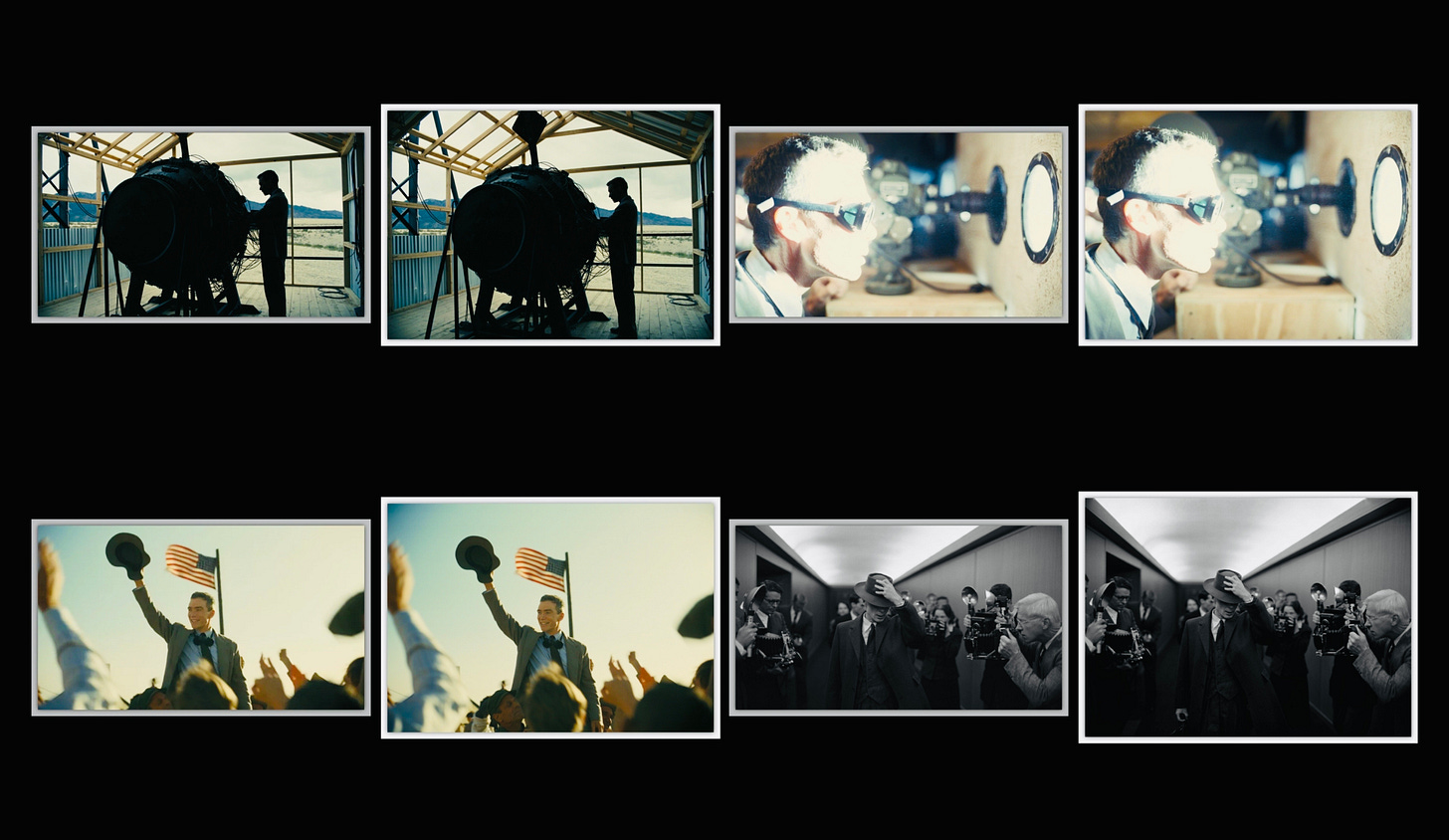
In mid-2023, during the height of the shared success stories of Greta Gerwig’s Barbie, and Christopher Nolan’s Oppenheimer, as their fates were entwined and elevated by the once-in-a-lifetime “Barbenheimer” meme craze generated by internet word-of-mouth, I too was swept up in the infectious1 hubbub, especially as it was all happening in the then-imminent run-up to my 30th birthday.
Now, in the UK, there are a perishingly few number of venues across the entire country that have the requisite facilities for showcasing Nolan’s preferred format of IMAX, with the gigantic, maximum-sized 15-perf/70mm honest-to-god celluloid prints for projecting. In my case, residing in South Wales as I do, I am nowhere close to any of those venues. The BFI IMAX in London, and the Vue Printworks in Manchester, are what one might refer to as “The Big Two” when it comes to where you’d most likely go to see such event movies distributed in genuine IMAX.2
I had prior history of travelling hundreds of miles for the express purpose of seeing a Christopher Nolan movie in 70mm IMAX, when I did that exact thing in 2017 to see Dunkirk at Manchester’s Vue Printworks cinema. And so, with the advent of Nolan’s Oppenheimer being the next big occasion to do that again, I made my intentions clear to the universe (read: my teeny tiny social media following) that, to mark the passage of my 30th birthday, I intended to find a way to go see the film at London’s BFI IMAX, which is touted as the largest IMAX screen in all of Europe.
This trip thankfully did come to pass, albeit not until a little while after my initially planned 30th birthday cinephilic celebration, for my original trip was annoyingly scuppered by circumstances that’ll be detailed shortly. Suffice it to say, though, that it would not have been possible for me to have gone to see Oppenheimer in maximum IMAX without the money bestowed to me for that purpose by the collaborative generosity of both my dad, and my Nanny (his mother/my grandmother), working together to gift me the funds needed for the train to-and-from London, and the rather steep BFI IMAX ticket.
As my Nanny passed away in October of 2024, this is one of several interrelated posts I’ve written - and have yet to write - that are all indebted to her memory, everything she did for me, and everything she meant to me and the family. This little story is merely one of innumerable examples pertaining to her kindness and aid for those she loved, for which I am eternally grateful.
Now, here follows the recounted experiences surrounding my viewings of Oppenheimer, what happened to me in and around those excursions, and the thoughts I had on the film itself…
I. FISSION (First Viewing - Standard Format)
July 29th 2023:
“You don't get to commit the sin, then have us all feel sorry for you that it had consequences.”
When Oppenheimer eventually comes out on home video, I can't wait for someone to inevitably splice together the depictions of the Trinity atomic bomb test from both this, and Part 8 of Twin Peaks: The Return.3
All the horrors of the world unleashed with one atomic blast, Ludwig Göransson's feverishly intense score building to an overwhelming crescendo, before giving way to Krzysztof Penderecki's 'Threnody to the Victims of Hiroshima', and David Lynch's nightmarish vision of the unfathomable insides of that first fateful mushroom cloud...
(More proper thoughts on Oppenheimer to come, after I rewatch it in full 70mm IMAX very soon. Watch this space…)
II. FUSION (Second Viewing - IMAX 70mm)
September 20th 2023:
“You can't lift the stone without being ready for the snake that's revealed.”
When I saw Oppenheimer for the first time on July 29th, I was satisfying two particular remits I felt were necessary. One was to, naturally, watch the film back-to-back with Greta Gerwig’s (excellent) Barbie, for the “Barbenheimer” meme of it all; the other was to watch Oppenheimer once on a standard-sized silver screen, so as to get my bearings on the story and set my expectations for the film’s quality according to its own merits, before I would set off less than a week later to see it in its absolute ideal form - in vision-dwarfing, full-scale IMAX 70mm at the (imaginatively named) BFI IMAX in Waterloo, London.
I also ended my initial mini-review for Oppenheimer by saying that further thoughts on the film would be forthcoming after I rewatched it in IMAX quote-unquote “very soon”. At the time that was written, my train and cinema tickets had already both been booked for me to fulfil that promise just four days later on August 2nd: the date of my 30th birthday.
But then, Fate - that unscrupulous croupier of life - dealt me a bad hand, thwarting my plans by way of COVID-19 deciding to reach a mutational stage that finally infiltrated my system after 3 years of me managing to elude its clutches. And what's worse is that I suspect I caught the dreaded 'rona during that very July 29th outing to do the “Barbenheimer” double-bill in the first place.
(Obviously it was just a rotten bit of bad luck and happenstance, not some malicious conspiracy wrought by a vindictive universe to target me for misfortune, but even so, the sheer spiteful timing made it hard not to take it personally, irrational as that may be.)
Anyway, during Oppenheimer's pleasantly surprising storming of the 2023 worldwide box office, the BFI IMAX - one of the only 3 places in the UK that had the facilities to showcase the film in its best possible form4, per Christopher Nolan's wishes - was still in such high demand for its 70mm IMAX screenings, even over 8 weeks post-opening weekend later, that they extended their run of showings just long enough for me to throw caution to the wind, and say: fuck it, just try again, spend the money you don't have, and go see the damn movie the way it should most ideally be seen, as you'd originally intended.
Financially? An objectively terrible and shortsighted decision that's left me totally flat broke for the next few weeks.
Experientially, as a trip and a destination to later look back upon without regret? COMPLETELY WORTH EVERY PENNY.
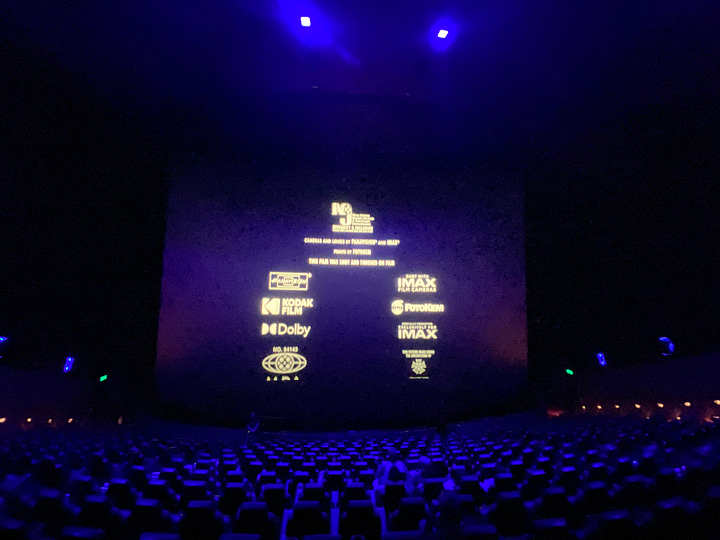
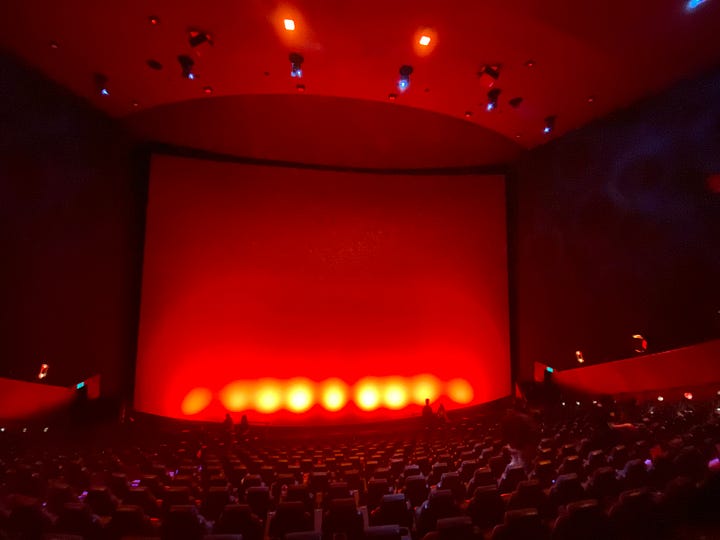
On the BFI IMAX's toweringly ginormous, literally building-sized screen that looms over the audience, the overwhelming enormity of Nolan's vision for Oppenheimer truly comes into focus, as you get utterly consumed by the sights of the vertiginous vistas of the Trinity testing grounds, J. Robert's intrusive visions of quantum abstractions, Lewis Strauss' seething, (un)righteous fury burning behind his slippery diplomatic facade, and the vast oceans of Cillian Murphy’s piercingly blue eyes, IMAX's statuesque portraiture of every intense closeup rendering his pale cerulean irises large enough to dwarf Murphy’s actual life-size height in his entirety. (That may not even be hyperbole. Somebody grab the measuring tape!)
And the sound!
I had to grip my knees in anticipation of the scenes with the two biggest “jump scares” (for lack of a better term) of the film - the first atomic bomb going off in the Trinity test, followed by the sickeningly patriotic, cacophonous post-Hiroshima pep rally at Los Alamos - because the way the sounds of those moments feel like they concave your chest, hitting your soul with the force of an iron fist, left me slightly shaking at the nerve-shredding intensity.
(Funny... I think I said something similar when I saw Dunkirk in 70mm IMAX back in 2017. Guess that’s Nolan for you.)
Speaking of the sound of things: as a screenwriter, whenever he's at the top of his game, Nolan's perhaps most underrated quality is how good he can be with economical efficiency in his dialogue, expressing a lot of expositional and character information with the least amount of words possible. It may not be necessarily realistic dialogue, but who needs it to be? All this to say that, after a decade or so of Nolan treating the dialogue in his films as a sound design afterthought5, ol' Chrissy boy has finally decided that for Oppenheimer, the dialogue is what's most vital to the film, because virtually 100% of the story is comprised of characters talking to each other in various rooms, and he can't toy around with treating their dialogue as a commodity of lesser importance in his grand scheme of things. In Oppenheimer, words matter. And because they matter so much, Nolan delivers one of the best screenplays - if not the best - in his entire esteemed body of work.
You see, on my train journey to London, I spent my downtime reading the film's screenplay (available here for legit educational purposes, for free!), and what I gathered, when comparing it to my memory of my first watch-through of the finished film, was that:
A) Every scene on every page is up there on the screen.
B) Nolan is always very cognisant of the edit to come, seen by how he notes every one of the numerous important illustratory insert shots he’ll have to shoot; bridging together scenes with huge jumps in time and location by having the end of one scene visually and/or thematically tee up the next; and differentiating Oppenheimer's and Strauss' perspectives not only through signposted changes of film stock (i.e. colour for Oppenheimer, black-and-white for Strauss), but also changes in tense and font formatting for each man (i.e. first person + non-italicised for Oppenheimer; third person + italicised for Strauss).
&
C) With the screenplay's words still fresh in my mind upon me settling in for my second viewing of the film, I was able to appreciate that, for as much as Nolan's dialogue has a Sorkin-esque rat-a-tat clip to its elegant verbal abridgements of who each character is, and what each character wants, told through the prism of the high-stakes professions they're all caught up in... Nolan still cut the dialogue even closer to the bone than the script already had, perhaps doing so either in the edit, or while on set with the cast and crew, somewhere in the collaborative maelstrom finding further superfluous words and sentences to cut.
To further the point of my praise, consider this early exchange in the film between Strauss and Oppenheimer, and how much you learn about both characters' histories, personalities, and worldviews:
STRAUSS
I’ve always wondered why you didn’t involve [Einstein] in the Manhattan Project. The greatest scientific mind of our time?OPPENHEIMER
Of his time. Einstein published his Theory of Relativity more than forty years ago, but never embraced the quantum world it revealed.STRAUSS
“God doesn’t play dice.”OPPENHEIMER
Precisely. You never thought of studying physics formally?STRAUSS
I had offers. But I chose to sell shoes.OPPENHEIMER
Lewis Strauss was once a lowly shoe salesman?STRAUSS
No. Just a shoe salesman.
In just 7 lines, you pick up on how Strauss is a fan eager to rub shoulders with a man he admires, from a profession Strauss wanted to be a part of, before he turned to a comparatively less exciting, but more real-world practical job. He has pride in having risen through the ranks as a “self-made man” from humble beginnings (something Oppenheimer dryly said he related to via his own father, rather than himself, suggesting Oppenheimer's upbringing was less hard-fought for than Strauss', at least by Strauss' interpretation of that exchange). But Oppenheimer offhandedly using the word “lowly” in conjunction with “shoe salesman” rubs Strauss the wrong way, hitting a nerve where a chip on his shoulder is buried deep, as exemplified with sublime subtlety by Robert Downey Jr.'s powerhouse inhabitance of this role that would be easy to boil down to a pantomime boo-hiss villain, but through RDJ's layered performance is made oddly sympathetic, even as you detest what his character does.
As they are throughout the film, Oppenheimer's motives behind why he says or does the things he does are often inscrutable and up for interpretation, with Cillian Murphy's remarkable, career-best performance imbuing Oppenheimer with a persistent nagging notion that perhaps even he doesn't know why he says or does the things he does either, and that he only tries to understand himself in non-linear hindsight, after the catastrophic consequences of his words and deeds have long since come to pass.
Was Oppenheimer being deliberately passive-aggressively withering to Strauss, or was he speaking in jest, figuring Strauss would take it as such in turn?
To Strauss, these snowballing little jabs at his character in this interaction, and every interaction with Oppenheimer thereafter - at least, as he perceived them, anyway - built up into a vendetta fuelled by jealousy, suspicion, pride, paranoia, and ego, because he interpreted Oppenheimer to be something of a reflection of himself: someone who does things out of calculated spite, who likes to flaunt his power and influence over others to get things to go his way.
But Strauss' fatal flaw was his ego making him so absorbed in his vision of the world, that it lead him to believe Oppenheimer thought of him in any meaningful way, rather than considering the more likely possibility that Oppenheimer was so absorbed in his vision of the world, that matters of interpersonal human dramas rarely occupied his complete attention.
Strauss' focus is too narrow, while Oppenheimer's focus is too wide, and as a result, the snake beneath the stone comes to bite them both.
I could write reams and reams of analysis regarding the densely layered complexity of Nolan's writing of these character projections of real historical figures, and how he configures them to tell a story of history that warns us of how easy it is for societies to sleepwalk into fascism, to get swept up in propaganda and wartime frenzies, scientific innovation getting immediately weaponised into tools for our own self-inflicted extinction, the bloodlust and riches wrung by capitalism and the military industrial complex creating a never-ending supply of wars to line the coffers of bureaucrats and generals and billionaires, and all the while, looming over us, the mortal threat of our manmade nuclear bombs becoming our unmaking. The final nail in humanity's coffin, created by long-dead people from nearly a century ago who birthed our doom under the naive pretence they were crafting the tools to save us from doom.
But that would be too long and arduous and soul-crushing to carry out, and besides, currently reading Thomas Ligotti's The Conspiracy Against The Human Race is in danger of making my pessimism levels reach critical mass, so instead I'll just say:
Oppenheimer is a monolithic achievement in filmmaking and storytelling, and Nolan should be proud.
The whole ridiculously stacked cast - Cillian Murphy, Robert Downey Jr., Emily Blunt, and the bajillion other top-tier actors that populate the film - are each of them worthy of their own dedicated paragraph per person, they're so good.
Ludwig Göransson's violin-centric score has been stuck in my head, and replaying constantly in my music streaming libraries over and over again, for months on end. A future rewatch review will probably be dedicated solely to espousing the brilliance of said soundtrack ad nauseam. (The track 'Can You Hear The Music' is the clear standout of the album, even more so when you think of it - as I saw one person say on Twitter - as a better theme for The Flash than The Flash's actual theme in notorious 2023 box office bomb, The Flash. They're not wrong!)
Seeing the film in full 70mm IMAX is an experience I'll never forget. Hearing the whirring of the film flitting through the projector’s mechanisms in the quieter moments; seeing the film grain and mild degradation of small sections of the print from the sheer amount of times it's been played; the moth that flew onto the screen for a few minutes, silhouetted against Cillian Murphy's face; learning that the entrance to the BFI IMAX building is not above ground, but in fact below, so I need not have run through the gaps in busy London traffic like I did to find the door I thought would be there, but wasn't.
Ah, good times.


Also, for what it's worth, I think it's important to note for posterity that the Letterboxd review from popular, prolific, never-not-political, and occasionally controversial reviewer, Sally Jane Black, is just flat out wrong on every conceivable level one can be wrong about a film.
To come away from watching Oppenheimer, and think that it's somehow pro-war, pro-nuclear bombs, pro-military, or pro-fascism, even going so far as to proclaim Nolan himself is a “far-right fascist filmmaker” (which she judges solely via Oppenheimer, and Nolan’s three Batman films, with none of his other works watched or taken into her consideration)? That is a mind-bogglingly shortsighted, shockingly media-illiterate, and bafflingly wrongheaded take for a generally pretty intelligent writer to have on a film where the only way it could be any clearer about its core messaging was if it held up a bright pink neon sign, written in Gaspar Noé font (Futura Medium Bold), that screamed at film’s end:
“WAR IS BAD. NUCLEAR BOMBS WERE A MISTAKE, AND ARE BAD. AMERICAN EXCEPTIONALISM IS A ROAD TO FASCISM, WHICH IS ALSO BAD. WE SHOULD NOT KILL EACH OTHER WITH NUCLEAR WEAPONS JUST BECAUSE OUR WORLD'S GOVERNMENTS ARE IN A ZERO SUM GAME WITH EACH OTHER TO SEE WHOSE NUCLEAR ARSENAL IS BIGGER. PEOPLE LIKE THIS HAVING POWER OVER WHETHER OR NOT A NUCLEAR APOCALYPSE HAPPENS IS BAD. THIS IS ALL BAD.”
But I digress.
And so it is that, at long last, my Oppenheimer quest is complete.
(An admittedly poor choice of words, considering what’s to come in my story.)
Without detouring too far into a tangent of interest to no one but myself, the supposed IMAX option at a place such as the Odeon in Cardiff is actually a small fraction of the size of the largest, proper IMAX screens in London and Manchester. Such falsely advertised IMAX venues are pejoratively referred to as “Lie-MAX”. Hence why I don’t use the more locationally convenient option of the Cardiff Odeon’s IMAX, because it’s not the real deal. For a size comparison of UK IMAX venues that don’t fall into the “Lie-MAX” trap, here’s a relatively recent infographic I found from Reddit:
Turns out that I had to pull a Thanos, and say: “Fine… I’ll do it myself.”
For more insight into the differences between the various screening formats available, and how they each individually impacted the look of the film, here’s some extra infographics I saved to my camera roll at the time:
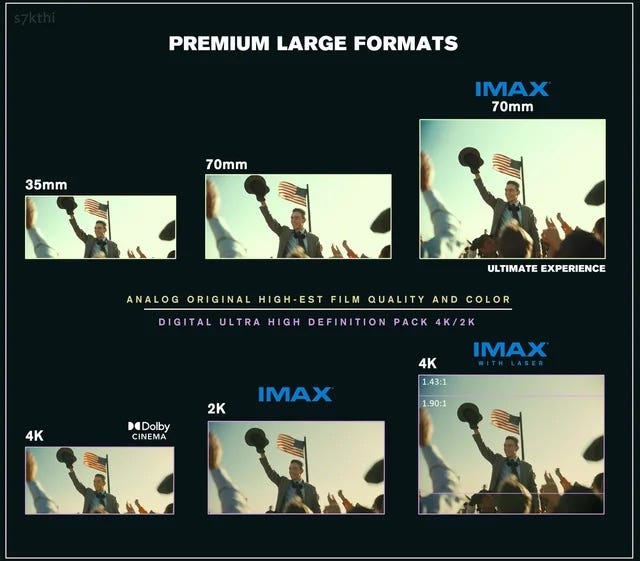
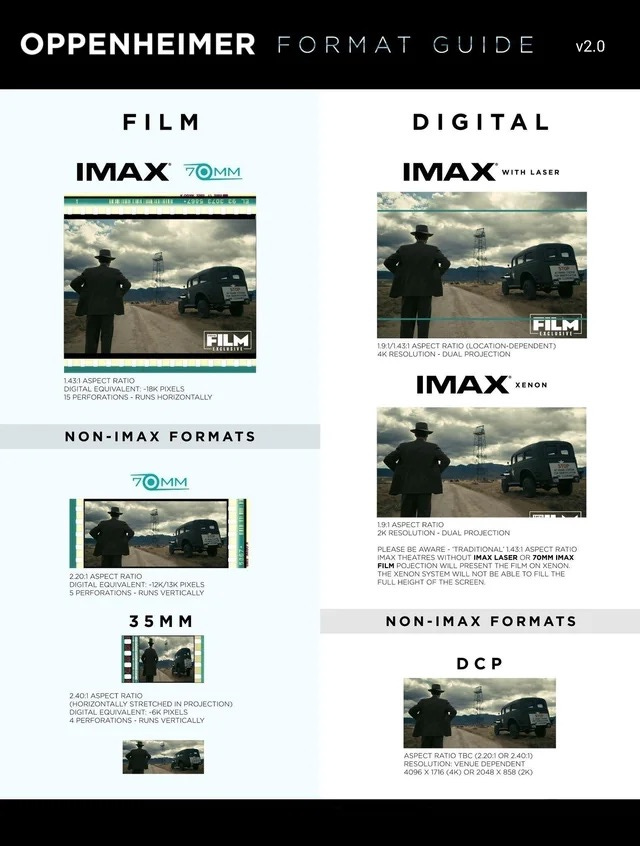


e.g. Whether it's The Dark Knight Rises, and frequently having difficulty understanding Bane's voice, or Gary Oldman's more softly spoken lines... or it's Interstellar, and trying to understand what the astronauts are shouting at each other over their microphones, while Nolan also makes Michael Caine's deathbed monologue intentionally hard to comprehend by going into the sound mix, and muting some of the words Caine says... or it's Tenet’s frequently-lambasted murky mix of sound, music, and dialogue all smeared into one, to obfuscate a viewer's understanding of what's being said, or what's even happening.











